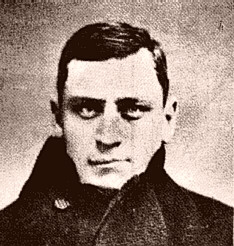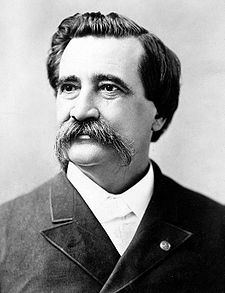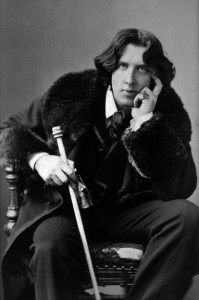Francis J. Alvany, the 19th-century bunco artist known as “Hungry Joe,” never had his fill when it came to schemes and dupes and ruses. Born in 1850, Hungry Joe spent most of his 52 years on Earth using hook, crook and any other means to separate marks from their money. He was so duplicitous that even when he passed away, no one was sure he wasn’t faking it. The New York Times dedicated newsprint to Hungry Joe’s chicanery as did the Brooklyn Daily Eagle. A trio of brief Eagle articles about his life and times follow.
••••••••••
“Hungry Joe and General John A. Logan” (May 5, 1889): “He came pretty near getting $150 out of General John A. Logan once. The general was in one of the rooms on the ground floor on the Twenty-third street side of the house where the ladies’ entrance is located. The boy at the door came and told me that the general had gone into his room accompanied by a bunco man. I went around and knocked at the door. Hungry Joe was just going away, but I barred the door and asked the general if he had given the fellow any money. The general was inclined to get nettled at my question, and blurted out that the young man was the son of the president of the bank in Chicago where the general’s account was kept. I said: ‘Why general, the man is a thief, a common thief.’ He would scarcely believe me. But presently Hungry Joe took $50 out of his pocket, which he got from Logan, and handing it back said I was on to him and the general might as well have his eyes opened. The general had given him $50 and was going to give him $100 the next day.”
••••••••••
“Hungry Joe Released” (Brooklyn Daily Eagle, June 21, 1896): “Hungry Joe, the famous bunco steerer and the man of many aliases, was released from the Maryland penitentiary this morning after serving a seven year’s sentence for swindling and left for New York at 8:10 A.M. He says he intends to become a bookmaker and follow the races for a living. Hungry Joe whose right name is said to be Alvany, is a native of Baltimore and is said to have swindled Oscar Wilde out of $1,500 during his checkered career. He was sent to the penitentiary here for swindling a Baltimore man out of $5,000, and has been a model prisoner, continually asserting his innocence of the crime of which he was convicted. He is said to be worth $150,000 as the result of his operations prior to his conviction.”
••••••••••

"With a simple three card monte game he emptied the pockets of a brother of a Brooklyn police captain." (Image by ZioDave.)
“Hungry Joe” (Brooklyn Daily Eagle, March 25, 1902): The late Hungry Joe–if he is late–was viewed with alarm by some and jealousy by others. The people who viewed him with alarm were those who were unfortunate enough to have money, or watches, or any other goods and chattels he wished to possess, for as he so wished he took them. The people who viewed him with jealousy, in which was a mixture of admiration, are the other people who try to get folks’ chattels away from them. For Joe was the slickest fellow in the bunco business. He it was who had the courage and the skill to wring money out of a judge of a criminal court, the late Judge Noah Davis. He bled the venerable Charles Francis Adam in Boston; he got hundreds of thousands of dollars from General Logan, Oscar Wilde and other more or less celebrities, and with a simple three card monte game he emptied the pockets of a brother of a Brooklyn police captain. The captain took it back.
Joe had partners who led his dupes into rooms where bogus gambling schemes were in operation, but for the boldest of his strikes he took no one into his confidence. In his way he was an artist, but his art was one that did not add much to the joy of nations, and in spite of his infrequent and mysterious exemption from arrest in this city he was arrested elsewhere and made to serve terms behind the bars. Probably he died–if he is dead–without leaving much to his heirs. Probably, also, if he had put the same ingenuity, the same address, the same energy into any decent business he would have made that business pay. This man elected–or elects–to pass his life in running away from the police. Either he buys safety with a large percent of his earnings, or he never knows sound sleep. He has his days of luxury and weeks of woe. It is a wretched, a contemptible life, that of a criminal, and nobody but a fool will choose it. Hungry Joe, the bunco king, was nobody’s fool at his work, but he was the poorest and cheapest of fools when he threw away the chance to make himself a rich, respected, useful man, to turn himself into a despised and hunted creature.”



